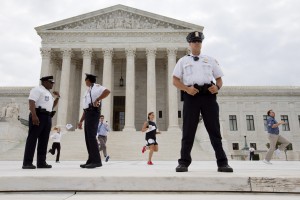The Supreme Court’s 5-4 ruling supporting same-sex marriage is in the “what’s next” phase.
BYU doesn’t expect any immediate impact. However, beyond campus, civil and faith-based groups are assessing the impacts.
Now that same-sex marriage is legal nationwide, religious conservatives are focusing on preserving their right to object. Concerns center mostly around thousands of faith-based charities, colleges and hospitals that set policies according to their religious beliefs that same-sex relationships are morally wrong.

According to Chief Justice John Roberts in the dissent, the decision was not backed by the Constitution or any of its amendments.
Lynn Wardle, a professor of law at BYU, believes several of the Supreme Court justices are committed to doing the politically correct thing but lean away from fundamentalist values.
“A host of religious liberty issues are going to erupt,” Wardle said. “There will be an undermine of religious issues of individuals.”
He referenced several previous rulings regarding bakers and florists who were sued for refusing to provide services for gay and lesbian weddings.
“The gays are going to force religious individuals to lose religious liberties,” he said.
BYU spokeswoman Carri Jenkins explained that BYU won’t see any changes because of the rights it holds as a private institution.
“The Constitution of the United States guarantees the free exercise of religion,” Jenkins said. “It is a fundamental right and one of America’s first freedoms. In addition, Utah state law recognizes the religious liberty of faith-based institutions, such as BYU, in providing housing and employment. As a result, we do not anticipate that the Supreme Court decision will have an impact on current practices at BYU.”
The Republican Party’s 2016 presidential candidates are already campaigning on the issue. Wisconsin Gov. Scott Walker urged President Barack Obama and the nation’s governors to join him in reassuring Americans that the government “will not force them to participate in activities that violate their deeply held religious beliefs.”
First Amendment protections for worship are clear, so the religious liberty fight isn’t about what happens inside a church. According to the Associated Press, potential conflicts could arise with religious organizations that have public business or religious associations that rent reception halls to the public or run faith-based social services and also receive money in government grants.
The Church of Jesus Christ of Latter-day Saints continues to support traditional marriage between a man and a woman. Church representatives say they honor the Supreme Court’s ruling but request respect for their traditional beliefs on marriage.
The church was ready with this firm statement, issued immediately after the ruling was announced: “The Church of Jesus Christ of Latter-day Saints acknowledges that following today’s ruling by the Supreme Court, same-sex marriages are now legal in the United States. The Court’s decision does not alter the Lord’s doctrine that marriage is a union between a man and a woman ordained by God. While showing respect for those who think differently, the Church will continue to teach and promote marriage between a man and a woman as a central part of our doctrine and practice.”
Roberts predicted a clash ahead between religious freedom and same-sex marriage. He noted the dilemma for religious colleges that provide married student housing and adoption agencies that won’t place children with same-sex couples.
Some institutions are clashing already. The Human Rights Campaign, the nations largest LGBT organization, announced plans to hold a conference in Salt Lake City just days before the conservative World Congress of Families stages a convention in the city.
Chad Griffin, president of the Human Rights Campaign, announced at a news conference Saturday in Salt Lake City that his group backs the Inclusive Families Conference on Oct. 23–24, according to the Associated Press. The World Congress of Families will hold its international convention Oct. 27–30.
The World Congress of Families supports what it calls a natural family consisting of a man and woman who unite in marriage for reasons including the full emotional development of children.
Although the ruling has no legal stand outside of the U.S., activists believe the ruling will influence their same-sex platform in other countries like the Philippines, India, Australia and elsewhere. Same-sex marriage is outlawed in some countries, but the movement is crossing nation’s boundaries and gaining pace.




